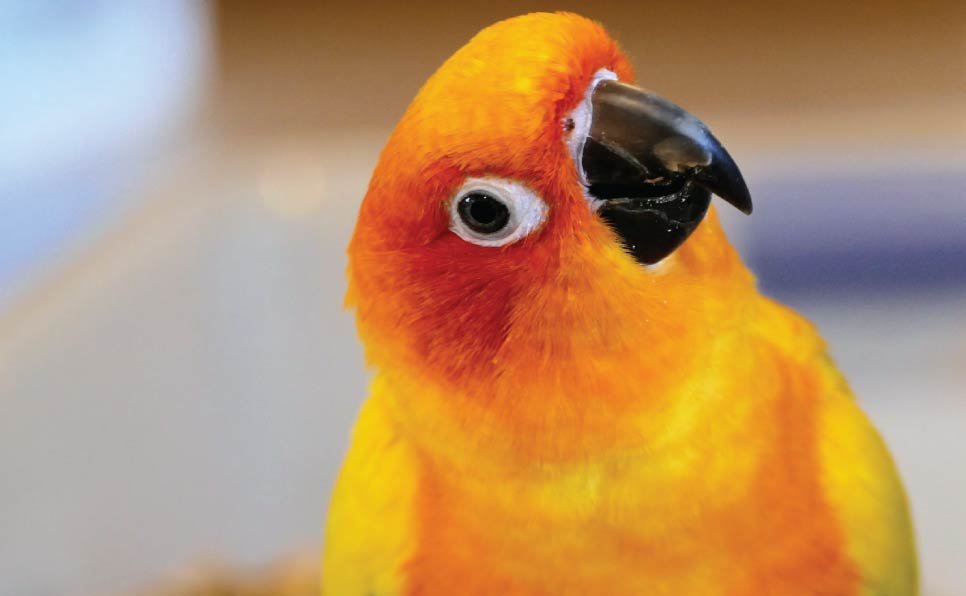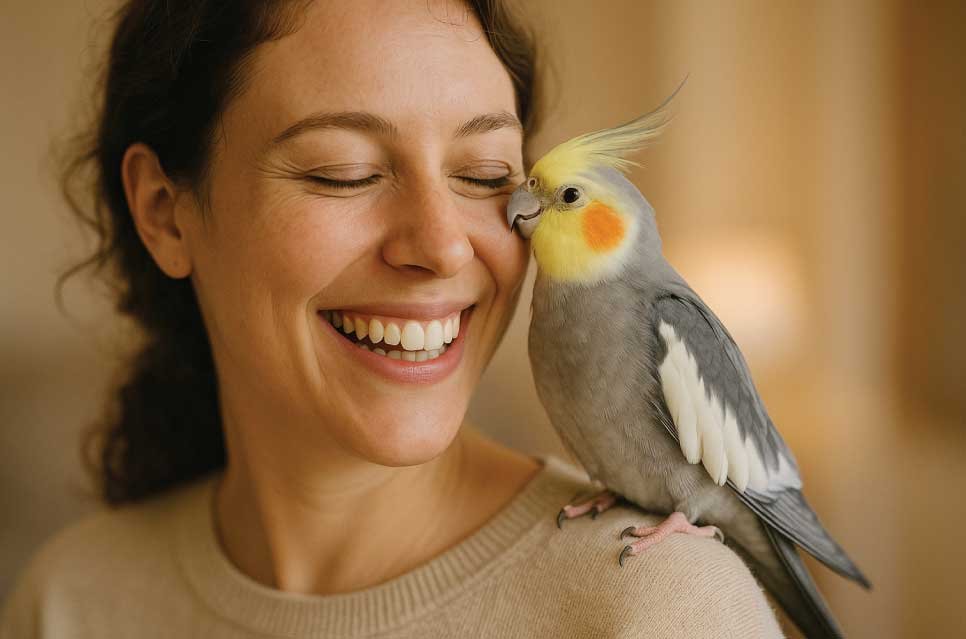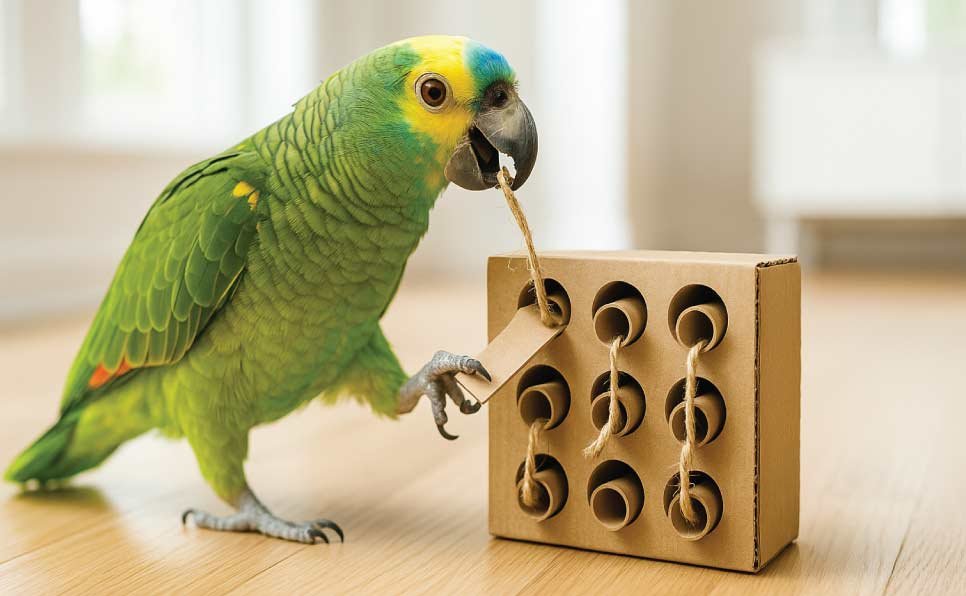There’s something magical about waking up to cheerful chirps and vibrant colors fluttering around your home. Exotic pet birds bring beauty, song, and personality, each one a little piece of the tropics sharing life with you. But before welcoming one, it’s important to learn what makes these feathered friends truly happy and healthy.
Welcoming an exotic pet bird is a joyful decision that comes with lifelong rewards and serious responsibilities. These companions, ranging from tiny finches to majestic macaws, all have distinct personalities, diets, and care needs. Choosing to bring one into your home means embracing a world of color, song, and connection.
At PetSweetJoy, we believe in responsible ownership and adoption. Many exotic birds end up in rescues due to a mismatch between their needs and an owner’s expectations. Adopting instead of buying gives a bird a second chance at a loving life, and it allows you to experience the deep gratitude of a rescued feathered friend.
Listen to the Podcast: Exploring Exotic Pet Birds
Choosing the Right Exotic Bird
Finding the perfect bird for your lifestyle starts with understanding what you can offer, time, space, and daily interaction.
Factors to Consider
When choosing among exotic pet birds, think about these key elements:
Size: Larger birds like macaws or cockatoos need spacious cages and extensive daily out-of-cage time.
Lifespan: Parrots can live for decades, while smaller birds like parakeets or lovebirds may live 10–15 years. This is a true lifetime commitment.
Noise Level: Some species are chatty and loud (like conures), while others are quieter (like finches).
Temperament: Social birds crave attention, while independent species are happy observing.
Dietary Needs: Each species has specific nutritional requirements that must be met.
Tip: Visit local shelters or avian rescues before deciding. You might just find a bird waiting for a second chance at love.
Researching Species
Each exotic bird species has a unique personality and care profile. Getting to know these differences helps ensure a good match.
Here are some popular exotic bird species to explore:
Budgerigars (Budgies): Small, colorful, and easy to tame. Ideal for beginners who want an affectionate, chatty bird. Read: Do Budgies Need to Be in Pairs?
Cockatiels: Gentle and intelligent, known for their whistling tunes and affectionate nature.
Conures: Bright, playful, and energetic. They love interaction but can be loud.
African Grey Parrots: Highly intelligent and great mimics, needing constant mental stimulation and strong bonds.
Lovebirds: Social and sweet, but they thrive on companionship and daily interaction.
Macaws: Strikingly beautiful, but require lots of space, enrichment, and extreme commitment.
Understanding these differences helps you choose a companion who fits your lifestyle and experience level. If you’re just starting out, visit our guide on Best Pet Birds for Beginners for friendly recommendations.
Setting Up the Ideal Aviary
A happy bird begins with a safe, stimulating, and spacious environment.
Cage Size and Design
Choose a cage that allows your bird to fully spread its wings and move freely.
Use horizontal bars for climbing species like parrots.
Avoid round cages; rectangular ones give birds a better sense of security.
Keep the cage in a bright area away from drafts or direct sunlight.
Stimulation & Enrichment
Birds are intelligent, playful creatures who need stimulation to thrive. Make sure to add:
Perches of different textures and sizes to keep their feet healthy.
Swings and ladders to encourage exercise.
Toys that challenge their curiosity, puzzle feeders, shredding toys, and mirrors.
Rotate toys regularly to keep things interesting! For creative ideas, explore our DIY Parrot Toys guide for safe and affordable projects.
Tailoring the Diet
Just like us, birds need variety and balance to stay healthy.
Balanced Nutrition
A proper diet supports bright feathers, sharp minds, and long lives. Most exotic birds benefit from a mix of the following:
High-quality pellets as a dietary base.
Fresh fruits like apples, berries, and melons (avoid avocado and chocolate!).
Vegetables such as spinach, carrots, broccoli, and peppers.
Seeds and nuts in moderation, as treats.
Tip: Consult your avian vet to personalize your bird’s diet, different species have different nutritional needs.
Fresh Foods vs. Commercial Diets
Commercial diets provide balanced nutrition but can be boring if fed alone. Fresh foods add flavor, texture, and mental stimulation. Mixing both ensures your bird gets the nutrients and excitement they need at mealtime. Variety is key, just like us, birds enjoy a little color on their plates!
Understanding Avian Health
Keeping an eye on your bird’s health ensures years of companionship.
Signs of Well-Being
A healthy bird will consistently show:
Bright, alert eyes
Smooth, shiny feathers
A clean beak and nostrils
Regular appetite and droppings
Playful, curious behavior
Regular Veterinary Check-ups
Schedule annual check-ups with an avian veterinarian.
Keep vaccinations and parasite prevention up to date.
Watch for early signs of illness: fluffed feathers, lack of appetite, or unusually quiet behavior.
Preventive care keeps little problems from becoming big ones. For extra guidance, read our Bird Health: Common Pet Bird Diseases article.
Behavioral Insights
Communicating with Your Bird
Birds communicate through body language, sounds, and even eye contact.
Soft chirps often mean contentment.
Tail wagging or head bobbing shows excitement.
Biting or fluffed feathers may indicate fear or stress.
Talk to your bird often! Gentle conversation builds trust and encourages them to mimic your tone.
Addressing Behavioral Challenges
Some common challenges include:
Excessive vocalization: Often a sign of boredom or loneliness.
Feather plucking: Could mean stress, poor diet, or lack of stimulation.
Aggression: Usually caused by fear or hormonal changes.
Patience and consistency are your best tools. Seek help from an avian behaviorist if issues persist.
Common Misconceptions
Let’s clear up a few myths about exotic birds:
Myth: All parrots talk.
Truth: Only some species mimic speech, and it depends on personality and training.Myth: Big birds are always high-maintenance.
Truth: Smaller birds can also need lots of attention!Myth: Birds are happy alone.
Truth: Most exotic birds are social and thrive on daily interaction.
Understanding these truths helps prevent unrealistic expectations and supports happier adoptions.
Legal Considerations
Before adopting or purchasing an exotic bird, check local and international regulations.
Some species require permits or are protected under CITES (Convention on International Trade in Endangered Species).
Always verify with your local wildlife authority or avian rescue.
Responsible ownership protects both the bird and the ecosystem.
Ivestigate the specific permits or licenses necessary for owning exotic birds in your area. Compliance with legal requirements contributes to the welfare of both the bird and the community.
Building a Bond
Trust-building Exercises
Start slow. Sit by the cage, talk softly, and offer treats through the bars.
Let your bird come to you at their own pace.
Use positive reinforcement, reward calm curiosity.
Consistency and kindness build unbreakable trust. Once your bird feels safe, they’ll begin to seek your company.
Introducing Exotic Birds to Other Pets
If you have cats or dogs, safety comes first:
Keep early interactions short and supervised.
Never leave your bird unattended around other animals.
Allow visual contact before physical proximity.
Gradual introductions help everyone feel secure and respected.
Recognizing Signs of Stress
Watch for stress if your bird:
Stops singing or eating
Shows aggression or feather loss
Hides often or becomes unusually quiet
To help relieve stress: provide a quiet corner in their cage to retreat to, play calming music or nature sounds, and ensure consistent feeding and play schedules. A calm environment helps birds feel safe and confident.
The Joy of Adoption
At PetSweetJoy, adoption isn’t just a philosophy, it’s a way of giving back. When you adopt, you’re not just saving a life, you’re gaining a loyal, loving companion who knows the value of trust. Rescued birds often bring deep joy and gratitude into their new homes. They remind us daily that love, patience, and second chances can transform lives, both theirs and ours.
Final Thoughts
Caring for exotic pet birds is a journey filled with song, learning, and connection. Whether it’s the gentle chatter of a cockatiel or the clever mimicry of an African grey, each bird enriches your home with personality and warmth.
Take your time, research well, and always choose compassion first, especially through adoption. With love, patience, and proper care, your feathered companion will reward you with years of trust, laughter, and companionship.
Subscribe to our newsletter for weekly pet happiness advice and become part of the PetSweetJoy community of caring, curious, and compassionate pet parents.
Exotic Pet Birds: Frequently Asked Questions (FAQs)
No, not all exotic birds have the ability to talk. Talking is more common in certain species, such as parrots, and individual variation exists.
Identify potential triggers and provide engaging toys or activities to redirect their focus. Consistent positive reinforcement can help modify behavior.
With proper planning and acclimatization, traveling with exotic birds can be safe. Ensure a secure travel carrier and familiar items for comfort.
Exotic birds are highly trainable. Positive reinforcement techniques can be used to teach tricks, commands, and even mimicry.
Lifespan varies among species. While some small parrots may live 15-20 years, larger species like macaws can have lifespans of 50 years or more.
Exotic birds require time, attention, and a commitment to their well-being. Regular interaction, a balanced diet, and routine veterinary care are essential.
Providing toys, puzzles, and social interaction are excellent ways to keep your bird mentally stimulated. Birds enjoy challenges that engage their intelligence.









